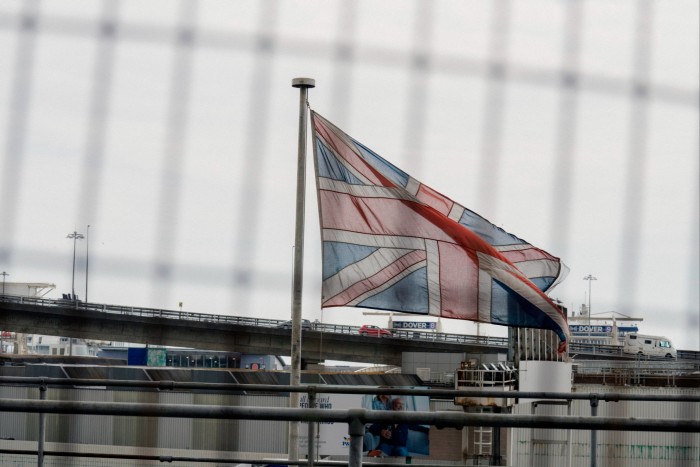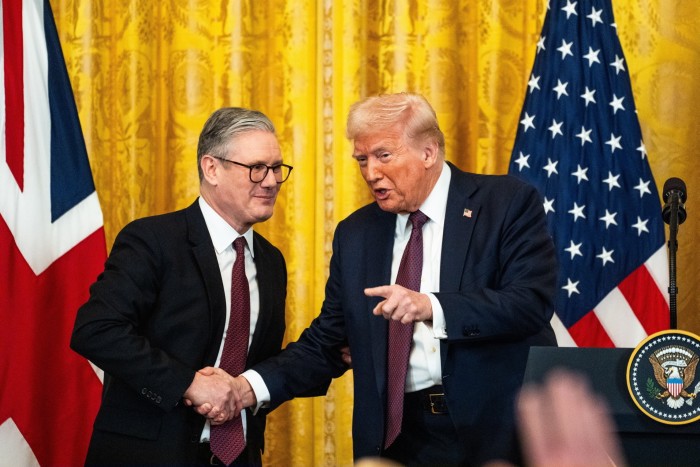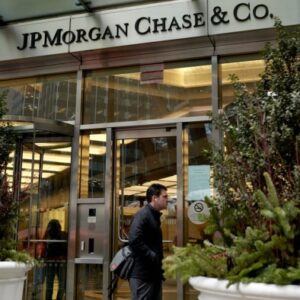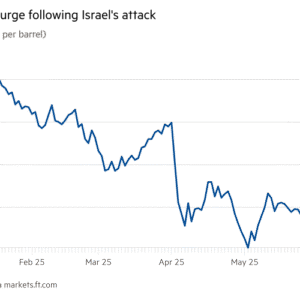It was just like old times. The sleepless nights, the last-minute haggling (over fish), the accusations of betrayal, of surrender, of joining a European army; and even, for good measure, an allusion to Theresa May’s Chequers deal. Brexit, which had dominated the lives of the British for so long, was back.
What was absolutely not like old times was the substance. Emerging from their discussions at London’s Lancaster House, the prime minister and his EU counterparts reeled off a list of areas in which they intend to co-operate more closely. Not since the referendum of 2016 (and, thinking back to David Cameron’s premiership, maybe even before then) had there been such an attempt to reinforce the UK-EU relationship.
Such reinforcement was deemed necessary by both sides, given the significant economic and political challenges Britain faces at home and the turmoil abroad. The latter poses particular problems for a country that decided to exit the continental-sized bloc of which it had been part. Brexit has not only increased the cost of trade with Britain’s nearest and largest trading partner, but left the UK more exposed to global insecurity, not least by separating it from collaborative EU attempts to bolster European defence spending. The ongoing war in Ukraine, the unreliability of the Trump administration and the slow demise of global free trade all pose particular problems for Brexit Britain.
But, as ever when it comes to Brexit, there are trade-offs involved in any decision to work more closely. Growth-improving measures to align with the EU require sacrifices of “sovereignty”. On security, it is the EU that has to decide whether it prioritises self-sufficiency over the greater effectiveness that collaboration with the UK would provide. And there are signs that such trade-offs, at long last, are being explicitly addressed.

Several things became apparent at the London summit. First, the power imbalance between the two sides. This should have been obvious to anyone paying attention to the earlier Brexit negotiations, during which the UK quickly caved in debates on money and the sequencing of negotiations (the “row of the summer” predicted by then Brexit secretary David Davis never materialised).
At least then the EU had an interest in preventing a “no deal” outcome. The absence of a status quo default option provided both sides with an incentive to negotiate. Now, however, the EU is relatively happy with the economic status quo bequeathed by Boris Johnson’s Trade and Cooperation Agreement of December 2020. Hence, in the run-up to this summit, it viewed the default — no deal — option as perfectly serviceable. And so, EU negotiators could hold London hostage over its desire for a deal on agriculture, insisting on a 12-year extension to current fishing quotas in return. Neither of the UK’s key “asks” — access to the EU’s defence procurement schemes or a deal on agricultural trade — were formally signed off.
That being said, both sides were also wary of the optics of failing to agree anything. Geopolitics, at long last, was a major issue in the bilateral talks (many commentators felt it should have informed the original negotiations to a greater extent than it did). Failing to agree a security deal because of a row over fishing would not have been a good look.
And nowhere was this new determination to achieve practical results more obvious than on the British side. After years of posturing, of ridiculous claims that “no deal is better than a bad deal”, the sheer pragmatism of the UK government came as something of a shock. Acutely conscious of the political incentives to set clear limits (red lines) to its ambitions, it was, nevertheless, all too aware of the need to reduce trade frictions and secure a tighter security partnership.
The outcomes were solid and sensible, if not earth-shattering: broader than expected in terms of the issues covered, yet thinner in terms of what was actually agreed. Much of what was discussed still needs to be negotiated in detail. Yet there is a deal allowing for greater co-operation on security (broadly defined).
The two sides are also committed to reaching agreement on measures that, while retaining the Trade and Cooperation Agreement, rub away at some of its rough edges. Specifically, the UK has agreed to negotiate “dynamic alignment” in agriculture and energy — meaning it will automatically adopt EU regulations and submit to the ultimate authority of EU legal authorities.
All of which served simply to make the outcry in traditional media more remarkable. The usual suspects were out in force: “Done up like a kipper” (The Sun); “Starmer’s Surrender” (The Daily Mail); “Kiss goodbye to Brexit” (The Daily Telegraph). It has been extraordinary to watch those who cheered Boris Johnson’s Brexit deal to the rafters calling the extension of the fishing quotas he himself negotiated a “betrayal”. But what was really striking was how appallingly dated the “Brexit debate” felt. The real challenges Britain faces demand more than slapstick outbursts about betrayal or surrender.
It was never easy to argue that Brexit would make Britain more prosperous, but there is now data to show that it has not. Leaving the EU has had a negative impact on both trade and investment, contributing to food price inflation and to lower government revenues.
Of course, for some Brexiters, any impact on trade would be more than compensated for by regulatory freedom. Outside the EU, they had long argued, the UK could regulate as it wished, and hence enhance its competitiveness relative to its neighbours.
Yet post-referendum, these same Brexiters simply couldn’t figure out how to exploit this newfound independence. A gulf opened between their words and their deeds. In a campaign video involving a shredder and stacks of A4 paper, Rishi Sunak — vying to replace Johnson — promised to “review or repeal” all retained EU law within his first 100 days. As prime minister, however, he not only delayed a number of plans for regulatory divergence — including the mandatory use of the new “UKCA” product quality mark (the story of which was tracked in painstaking detail by the FT’s Peter Foster) — but dramatically watered down his campaign pledge to get rid of remaining EU law on the UK statute book.

Brexit opportunities, in other words, have not survived contact with reality. Which raises a question as to the purpose of regulatory freedom. It turns out the choice is not between alignment with the European rules on the one hand, and a smart, agile approach to regulation providing the UK with a comparative advantage over a sluggish and over-cautious EU on the other. Rather, it is between having roughly the same rules with limited access to the single market or formally agreeing to align with the EU and enjoying full market access (or, in the language of the most exhaustive recent study, between replication and integration).
Given this, the government’s decision to agree to limited integration in specific areas seems an obvious way of removing some of the trade frictions caused by the Trade and Cooperation Agreement. Not least given the current state of the UK, hamstrung by an appalling lack of growth, trapped in a fiscal straitjacket (partly of the government’s own making), with public services in some cases literally collapsing and a dramatic decline in support for what used to be called the major political parties.
Incremental steps to try to prevent food price inflation and to ease energy trading across borders are logical steps in these circumstances. It hardly hurts either that alignment in both sectors will help address some of the problems that have haunted the operation of the trade border between Great Britain and Northern Ireland introduced as a result of Brexit.
All this, of course, in a world that has changed profoundly since the vote to leave. Perhaps the vision of Brexit Britain as a buccaneering trading nation made some sense in 2016 (although trade deals were never going to compensate for the economic impact of leaving the EU). Perhaps it still did in 2020, when Johnson stood up in Greenwich and spoke of Britain’s desire to go “out into the world . . . re-emerging after decades of hibernation as a campaigner for global free trade”.
Global free trade, however, was about to take a battering. Covid-19, the war in Ukraine, and above all growing tensions with China rapidly reshaped the international and domestic economic policies of the major powers. Reshoring and resilience became the new watchwords. Huge sums were splurged by the EU and the US in the form of subsidies for domestic industry that the British state could only dream of matching.
Well before Donald Trump’s re-election, globalisation was in retreat and our major trading partners were turning inwards. Then came Trump himself, undermining free trade by means of his erratic tariff policy. The US, one-time guarantor of the rules-based international trading order, is busily engaged in tearing it up.
Brexit, through no fault of Britain’s, was thus spectacularly badly timed. This is not the easiest moment to be a medium-sized open economy in a world dominated by continental-sized trading blocs busy erecting barriers to trade.
Yet to date, the UK’s new(ish) prime minister has played the incredibly poor hand he was dealt with aplomb. He has adopted a strategy of striking deals where he can, of avoiding choices between prospective partners. And he has managed to maintain good relations with both our closest security partner (the US) and our largest trading partner (the EU) while strengthening trading relations with the latter as the tariffs imposed by the former begin to bite.
Indeed, to date, the British government has secured for itself a decent slice of the cake Johnson used to claim to be “pro having and pro eating”. It has decided to align with the EU where this makes sense (agriculture, energy), but to diverge in those sectors (financial services and tech) where it sees an advantage in going its own way. How long this remains possible is an open question.
It is yet to be confirmed whether rules around the gene-editing of crops fall foul of the dynamic alignment provisions in the agreement on agricultural trade that the two sides have undertaken to negotiate. And the balancing act becomes harder still on defence. The Trump administration has called into question the reliability of the US as an ally, and forced Europeans to imagine a world in which Washington could no longer be relied on to guarantee their security.
Where exactly the US ends up is anyone’s guess. But as Nathalie Tocci, director of the Italian Institute for International Affairs, put it at a Chatham House event, its future course lies on a continuum ranging from “indifference” to “betrayal”. The difference is one between a world in which the US gradually lessens its commitment to European security, and one in which Washington starts siding with our enemies.
The more closely US policy approximates to the latter, the more difficult Sir Keir Starmer’s task becomes. It is inconceivable in such a scenario that a British prime minister would continue to be able to avoid hard choices between the two sides of the Atlantic.

Whatever the outcome, Europeans will have to do significantly more for themselves. Which in turn means the EU and UK will have to work together more closely. It makes little sense for the EU to talk about increasing self-reliance while excluding one of the continent’s leading military powers.
Here, however, the Lancaster House summit disappointed. The texts contained much aspirational language, but little of substance. The Security and Defence Pact declared in sententious tones that European security is facing its “greatest threat in a generation” — yet proposes very few practical steps to address this. A proliferation of structures for dialogue is all well and good but falls far short of what is required if Europeans are serious about increasing their self-reliance.
All of which serves as a salutary reminder that Brexit is not simply about Britain. It is not merely on the UK side of the Channel that the debate needs to move on. Can the EU overcome the rigidity that marked its stance under previous Brexit negotiator Michel Barnier? Is it willing to become more flexible and to blur the distinction between members and non-members when it comes to security co-operation? Will it, in short, come to define Europe as meaning something broader than the EU? It is the answer to these questions that will ultimately determine how effective Europeans are in confronting the security challenges they face.
For all the questions that remain, the Lancaster House meeting established one thing that has been surprisingly unremarked on this week — that the Leave-Remain debate is now largely settled as a live political issue. The Labour party is complicit in designing a Brexit settlement resting on the foundations of exit from the single market and customs union. Starmer is a signatory to the project.
Second, given the challenges that confront the UK, it needs to focus much more on practicalities than abstract principles. And how poor the debate about practicalities has become. The notion that the chancellor stating the obvious (that British trade with the EU is greater than that with the US) should be breathlessly reported as news — or should require clarification from Downing Street — is frankly absurd. A more honest conversation about the trade-offs implied by Brexit is long overdue.
Finally, more nuance is needed because the debate is no longer simply about the UK and the EU. Starmer has been able to play a starring role in the so-called “coalition of the willing” because, although the EU plays an important role when it comes to the development of military capabilities, it wasn’t designed for the deployment of military power at scale.
At issue, then, is not simply bilateral co-operation, but also the potential of alternative institutional forums that can be deployed to ensure that Europeans are able to shoulder their responsibilities.
It is hard to make the case that Brexit has made Britain wealthier or safer. Nor is it fair to argue that Brexit alone is responsible for the challenges that have accumulated since the referendum. Screaming about Brexit betrayals or railing against Brexit itself is increasingly pointless. Britain needs to move beyond the simple slogans and decide which forms of pragmatic co-operation would best suit its purposes.
And it is important to make the most of any momentum generated by the summit. During his press conference, the prime minister implied that more has been agreed than is in fact the case, but it is incumbent on both sides to move quickly to place some flesh on the bones of what has been agreed.
This is particularly pressing when it comes to collaboration on defence procurement. Arguments about the degree of access the UK should have to EU schemes are not the way to maximise a collective ability to confront the various security threats faced by the west.
In some respects, Britain has come a long way. It’s not so long since senior politicians in the governing party were openly expressing their hope that the EU would fail. Or since Liz Truss told an audience that she couldn’t decide if French President Emmanuel Macron was a friend or a foe.
Now, in contrast, it seems as if the grown-ups are in charge. Practical issues have taken the place of political posturing. We are beginning, slowly, to see the government hint at some of the trade-offs implicit in the UK-EU relationship. Of course the issue is not wholly settled in the sense that Britain is doomed to be locked in a permanent set of negotiations with the EU. But it will not serve us well if we think of these talks in terms of the shibboleths of the past.
Anand Menon is director of the think-tank UK in a Changing Europe and a non-resident fellow of the Brookings Institution
Find out about our latest stories first — follow FT Weekend on Instagram, Bluesky and X, and sign up to receive the FT Weekend newsletter every Saturday morning




